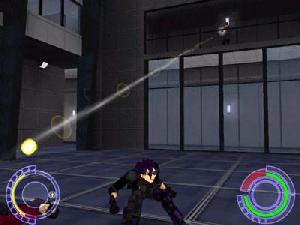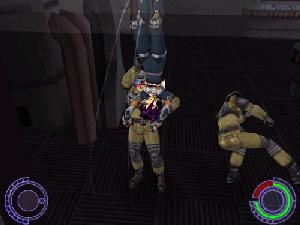For your eyes “Oni”!
If you think it’s tough growing up in the shadow of an older sibling, how
about coming of age in the shadow of a sibling that has yet to be born? At last
year’s E3, the playable demo of Oni for the Playstation 2 was shamefully
easy to get to, while people waited in line for an eternity just to see a quick
movie of Halo. Admittedly,
the game isn’t captivating at first glance. But look a little harder and you’ll
quickly discover why this third-person action romp from Bungie (originally,
though it’s published by Rockstar) deserves attention.
You play as Konoko, a mysterious androgynous special agent with metallic purple
hair and a touch of amnesia who takes orders in pseudo-technobabble from a robotic
6 year-old whose voice alone embodies all that is heinous in anime. Confused?
Forget about it. Despite all the chatter, there isn’t enough of a plot to give
Goodnight, Moon
a run for its money.
Oni makes up for the absence of a coherent storyline with the addition
of a nifty little objective proximity icon at the bottom of the screen. It indicates
both the altitude and direction of your objective targets, and it makes it possible
to ignore the plot and concentrate on Oni‘s strongpoint: action.
This game plays like a cross between Syphon
Filter and the Tekken Force mode in Tekken
3. You maneuver Konoko through packs of syndicate baddies who are eager
to take her down by any means necessary. All that stands between Konoko and
a nasty death is her impressive repertoire of hand-to-hand fighting moves augmented
by the occasional weapon.
As in Syphon Filter, your enemies aren’t that much weaker than you,
and they won’t stand there and let you pump them full of shots. They will run,
duck for cover, and maneuver around your attacks. If you are seen from a distance
– say, from two floors above you in an open gallery – they will either fire
at you from where they stand until you return fire, or they will race down the
stairs for a face-to-face confrontation. If they become disarmed they will fight
mano-a-mano until they can retrieve their weapon. Even if they were originally
unarmed, they will pick up an available weapon and make good use of it. And
even grunts will bust out with piledrivers and suplexes when you least expect
it. At times it seemed as if opponents fought harder and smarter the more I
played. Very impressive!
Though the game is linear, there’s more than one way to achieve an objective.
Honestly, that’s half the fun, plotting plan B, C, D, etc. after plan A falls
flat on its face.
Game controls are simple (thankfully) and combos are easy to pull off. It’s
possible to get away with button mashing, though you’ll find you’ll want to
know what you’re doing early on. The enemy is legion, health hypos (health)
can be scarce, and ammo can be hard to come by.
Besides, some of the moves just look damn cool. Konoko can disarm someone
and twist their arm so they turn the gun on themselves or she can do a triple
hit combo and then cartwheel out of danger. She’s got a lot of fighting to do
so she might as well look cool doing it.
Oni lacks an in-game save and checkpoints are few and far between. This
contributes to the, at times, aggravating difficulty of the game. However, unlike
more adventure-oriented games requiring tedious low-pressure tasks, Konoko wades
through wave after wave of combat with no inane puzzles to slow things down.
Amen!
The game seems focussed on propelling Konoko forward. She can not only run
while firing most weapons, but she can reload while running as well. Although
she may carry only one firearm at a time, she can pick up guns and ammunition
from less fortunate combatants. Other characters within the game can give you
health, ammo and other beneficial items (and after they hand them over to you,
you can sock ’em in the head – who said Konoko was big on gratitude?).
 Despite
Despite
the burly action, Oni isn’t the prettiest game on the shelf. Environments
are large and well designed but lack interesting textures. Spaces within the
game are unfurnished and barren, primarily the sterile-corridors-with-crates
motif which the gaming industry seems so resistant to making a departure from.
Character design is also lacking. Konoko fares the worst for it, looking like
the secret love-child of Goku and k.d. lang.
There are frequent points in the game where Konoko’s survival depends on how
quickly she can flee. Say you just defeated an opponent strapped with C4 hooked
to a three-second timer. As he’s dropping, he activates the self-destruct. You’d
think Konoko would want to get out of there in a hurry. But instead of adding
a single “dash” button to the controls to speed up Konoko’s default run, it
is a double-tap forward affair which, in the most inopportune times, can result
in some kind of sluggish ambling followed by a speedy death.
Controlling Konoko is an exercise in patience and self-discipline. Her complete
freedom of movement in 3D space is handeled well with the analog sticks (providing
a toggle for sensitivity), but unfortunately this does not make the learning
curve any less severe.
Think of an old-school dual-stick tank game, but here you’re controlling a
bipedal character, not a tread-based vehicle. Needless to say, it’s not very
intuitive and mastery doesn’t come easy. Luckily, the PS2version of Oni
(unlike it’s PC counterpart) offers four
different controller setups. All of these take some getting used to, but at
least with the Playstation 2 you get some choices.
On a much more minor note (wow, look at all those m’s), the load times for
this game are about average…for a PS1 game. Waiting for this game to load
is flat out brutal, considering this is the next-generation system that boasts
speedier load times when compared to it’s predecessor. I guess those huge (but
empty) environments take quite a bit time to load up.
However, Oni manages to compensate for dull graphics, empty interiors,
lengthy load times and unfriendly saves with intense action and impressive enemy
AI. The game is fun, challenging, worth the frustration and is a splendid addition
to your PS2 collection.

-
Impressive Enemy AI
-
Plenty of moves
-
Plenty of action
-
Fun and challenging
-
Bland, empty environments
-
Long load times
-
Checkpoints can be very far apart







